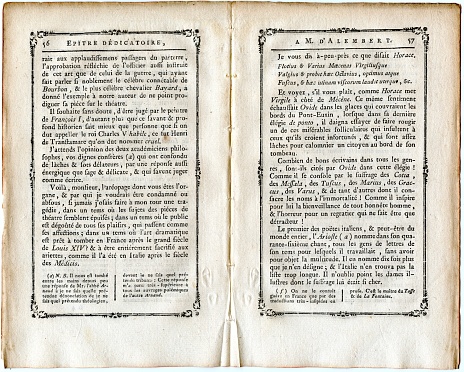
ave you expressed your love in French yet?
There are endless ways to show admiration for someone other than saying “je t’aime” (I love you) in French.
We’re going to explore all of the ways to express your love here, so by the end of this post you should be feeling like a natural-born French romantic!
What’s Le Diminutif (The Diminutive)
The diminutive in French can sometimes get out of hand, and this goes for most Romance languages, i.e. Spanish, Italian, Portuguese, etc.
While it may exist somewhat in English, it’s not at all the same. Two English examples using the diminutive go something like this:
1. itsy, bitsy
2. tubsy, wubsy
The first one we tend to associate with a spider: the “itsy, bitsy, spider.”
While the spider is probably not at all small, perhaps the biggest, most disgusting, scariest ginormous spider we’ve ever seen—the diminutive does its job to help ease the fear by adding an itsy, bitsy (in this case) before the word spider.
Itsy, bitsy is replacing the normal English word little.
See where this is going?
The second example, tubsy, wubsy, is well, a lighter, nicer way to call someone overweight.
Tubsy, wubsy is replacing the word tub. Calling someone a huge tub is terribly mean, so by changing it to tubsy, we are lightening the mood. The diminutive does its work here because while we’re straight up pointing out someone or something as “fat,” we are still sounding cute. Thus, avoiding any arguments, fights—you get the picture.
Are there any other English diminutive examples you can think of?
In French, the diminutive is semi-similar, the difference is that it could work for almost any word, making it all the more confusing.
Some French diminutive words are even considered official dictionary ones!
What they do is add a suffix to the end of regular French words. The lucky thing is that there are only two endings to remember.
French Diminuitive Suffixes
1. –et (masculine)
2. -ette (feminine)
At the end of masculine words, an –et is added to make nouns (person, place or thing) seem smaller (diminutive). And an –ette is added at the end of feminine words to make those seem smaller. Such as:
un livre (a book) can become un livret — a booklet (masculine)
un jardin (a garden) becomes un jardinet — a small garden (masculine)
une cuisine (a kitchen) becomes une cuisinette — a small kitchen (feminine)
une fille, une fillette — a little girl (feminine)
And so on…
While this rule may be true for most French words—the rules do bend a bit, like we see in all languages.
For instance, there are times when a feminine suffix is added to the end of a masculine word.
What’s that all about?
You’ll see what I mean when we get to our list of French terms of endearment.
Now that you know these, you’ll start seeing them everywhere. Be on the lookout for diminutive and terms of endearment in any French film you’re watching or book you’re reading. You can also add any word or term to your flashcard list to review later.
Remember to keep the diminutive rule under your belt so you won’t get lost as we go over the list!
5 Fundamental French Terms of Endearment
Note: The list is in no particular order, but I am organizing the words into two groups. The first will be “the regulars” and the second will be “the animal names.”
Of all the hundreds of funny, endearing pets names for a lover or friend in French, these 21 are the most popular amongst native speakers. That can change though, depending on regions within France—or even French Quebec, so don’t take my entire word for it.
1. Mon cœur
English translation: My heart
I consider mon cœur another overrated endearing term, but I couldn’t skip it due to its popularity, and especially not after already taking the spotlight away from mon amour.
Mon cœur (my heart) is simply not regularly used at all in English, do you agree? I’ve literally only heard it in a movie:
And you’re my heart, kid. Now, could I live without my heart?
That’s a line from the movie “Blow”—and that’s about it.
I would say that mon cœur translates—though not literally—to, “my sweetheart.”
Both of these puffed up terms (mon amour and mon cœur) should solely be sincerely said within a loving, unconditional, passionate relationship.
I say unconditional because it’s very common for parents (in France and other Romance-language speaking countries) to constantly refer to their children as mon cœur, mon amour or even ma vie (my life).
I believe this endearment-expressing quality is common among English-speaking homes too though.
On the other hand, the French do also enjoy flaunting these somewhat serious phrases to anyone, and I mean anyone.
The French are better lovers right? Well, that’s a bit too simple, because they’re part of a different culture altogether. They might be more verbally friendly than anything else, but that’s up to you to decide when you visit France someday.
2. Ma moitié
English translation: My other half
While it is more literally translated as “my other half” in English, I’d like to put it as “my better half” instead, because this is how English speakers generally say it. Doesn’t it just click and sound somewhat more natural?
In translation, the key is to find the exact feeling a word gives you, or the closest equivalent idiom for a phrase. Although we like to be exact most of the time, it’s good to forget about the literalness of things sometimes.
I’m not saying that you can’t translate ma moitié to “my other half,” it makes perfect sense.
But for some reason, the more popular English version, “my better half,” felt the need to make our other halves more special by putting them up on a pedestal (even though some of our stubborn selves may not actually believe our other halves are better than us).
To be honest, I like the French version way “better.” Simply, ma moitié.
Je besoin de ma moitié !
I need my other half (better half)!
Ma moitié is, like in English, usually said to a “partner in crime,” or a “main squeeze”—whether it be your best friend, sister, brother or lover.
3. Doudou
English translation: My blankie or my cuddly thing
I know what you’re thinking…
Doudou sounds like—but I promise you! It’s not!
And it’s untranslatable! Great. So what does it literally mean?
It’s a child’s most cherished, unable-to-let-go item as a toddler, usually a stuffed animal or blankie they can’t sleep, live or breathe without. And you guessed it, it’s a widely used term of endearment by the French.
Unfortunately we don’t have an exact equivalent—and that’s too bad because I really like the sound of it.
So where does this endearing doudou derive from?
Creole roots.
According to international French speakers, particularly from African countries, such as the West Indies, doudou is a slang/casual term used to refer to a girlfriend or wife, and it’s technically only said to females. This may explain why today the French use it as an expression of endearment.
Keep in mind that despite its Creole roots, it can be said to both sexes when used as an endearing term in France and other French-speaking countries.
I’d say the closest word to doudou in our English endearment dictionary is “pookie,” which, like doudou, is a fun, wacky, yet cute way to call a lover.
Viens ici mon doudou !
Come here, my pookie!
I mean, could you please tell me why we use “pookie” in English?
It’s just one of those crazy inexplicable words.
Note: Don’t get doudou confused with dodo. If you know what dormir means, then you must know what dodo means. It’s a shorter/slang version of dormir, which translates to, “sleepy bye-bye.”
Dodo is not at all the same as doudou, but one way to remember the both is like this:
Pas de dodo sans ton doudou !
No sleep without your blankie!
4. Ma chérie
English translation: My darling
We have a perfect, winning translation in English! Yay!
Before you go and start celebrating, let me remind you that the French word chérie is more complex than you think.
Can you tell me the difference between chérie, chéri, cher and chère? Man, that’s a lot of chers (I can’t stop thinking about the singer! Is that where she got her name from? Good Google question).
Now back to chérie…
Ma chérie and mon chéri both refer to “my darling,” the endearing term I am sharing with you here. The difference is that one is feminine (ma chérie, which is said to a female) and the other is masculine (mon chéri, which is said to a male).
The next two, ma chère (feminine) and mon cher (masculine) both translate to “my dear.” This would be the appropriate word to use when writing a letter or simply calling someone, “my dear.”
Like mon cœur and mon amour, ma chérie or mon chéri is said with an innocent, loving tone to either a lover or child, and even sometimes to a friend—especially in France.
Easier than you thought?
Tu es ma chérie pour toute la vie.
You’re my darling for all eternity.
5. Mon trésor
English translation: My treasure
Mon trésor reminds me of a “The Lord of the Rings” movie. Remember Gollum/Schmiegel, who’s always saying “my precious”?
Yep! That’s what I would translate mon trésor to!
Although it literally means “my treasure,” in English, we don’t really use the word “treasure” to refer to a loved one. Jewels and stones can be precious, like “treasure”—see the correlation?
The only fault I would give my personal translation is the fact that it’s typically only said to females in English. Very rarely do we hear women call men, “precious.”
But if a mother calls a son “precious” in English, it would still be plausible.
In French, mon trésor can be said to both males and females, friends, family and children.
No one is going to look at you like you have ten heads for calling a dude a piece of “treasure.” If he’s a hunk of a French man, go right ahead and call him mon trésor!
X marks the spot!





